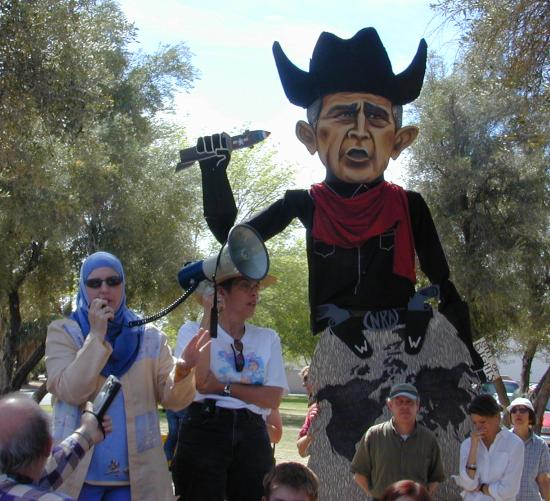
Nary a month goes by when Axes & Alleys does not receive some complaint about point number two in our September 2003 article “Helpful Hints for Protesters.” Many such letters are clearly from formerly gruntled puppet constructioneers, but a significant proportion seem to have come from a portion of the population who have had the felt pulled over their eyes. Ran Jirui responds.
“Papier mache puppets will change the world.”
– Sam Waterston, New England Blue Blood
“Grotesque effigies paraded down the metropolitan streets of the Western industrialized nations have solved monetary crisis after monetary crisis.”
– Hugh McCulloch, former Secretary of the Treasury (1865)
“I changed my tax initiatives because of them puppets.”
– George W. Bush, President Emeritus, United States of America
Look like fake quotes, don’t they? That’s because they are. And they always will be. You will never hear any of those people or anyone vaguely important say anything remotely in agreement with a positive view of puppetry vis a vis global change. In fact, on a graph with puppetry at one axis and global change at the other you will never see any positive movement because such a graph is impossible to create due to lack of data.
What you’ll find if you correlate the data on purchase of materials for the making of papier mache puppets expressly for use at anti-globalization protests is a net effect of jack squat. Even the disposal costs of such grotesqueries (as the esteemed Mr. McCulloch would put it) are less than the utility of water-soluble beer can.
In the context of the aforementioned point number two, “2. Puppetry will not create a workable interest rate,” let’s take a look at a photo of the Board of Governors of the Federal Reserve Bank of the United States of America:

Now, I’ll give you Donny Kohn might show up to a meeting with a sock-puppet in tow or put a papier mache manikin on the top of his Volvo, but no one listens to him anyway. There isn’t a single other member who would even look at a puppet if it was wrapped around a 50 grand note stuffed in the panties of a stripper with an economics PhD from Harvard dancing on a conference table at the Bear Stearns offices on Wall Street.
There are only three times in history when puppetry of any sort has affected anything of any consequence: Sun Tzu saw a shadow puppet play performed in what is now Thailand sometime in the 6th century B.C. which informed the final chapter of The Art of War on the use of spies, Wegbaja of Dahomey was inspired to construct a palace at Abomey around the 1650s by seeing a master puppet maker at work cementing the continuing success of that African empire, and most recently the Good Guy forces withdrew from the Aral Sea campaign as a result of the deformed representations of President Armstrong and corporate magnate Daniel Bester shown in cahoots at massive anti-war protests around the world.
Otherwise puppetry as an instigator or influencer of anything at all relevant to the grand movements of history is bunkum, a porpoise in the produce section, a flight of towels wending their way toward Saturn, three policemen in a submarine, your father wearing electrified nipple clamps at a rodeo, like smoking a cigar underwater, making love to utilitarianism, begging the question at the porn industry awards, a chair with a wart; in short, utterly ridiculous.

